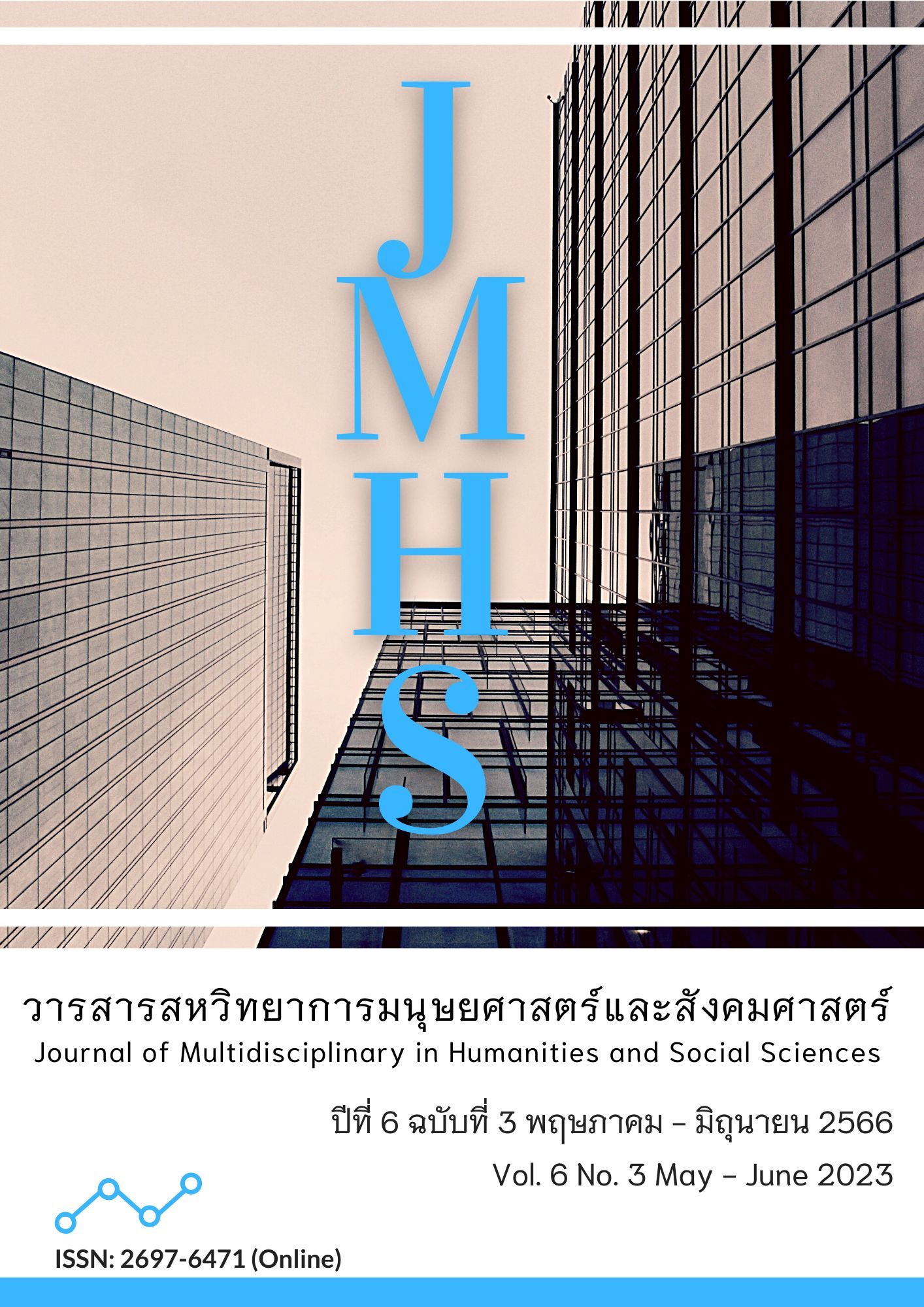การพัฒนาสมรรถนะการแก้ปัญหาแบบร่วมมือด้วยการจัดการเรียนรู้ แบบปรากฏการณ์เป็นฐาน เรื่อง ธรณีพิบัติภัย สำหรับนักเรียนชั้นมัธยมศึกษาปีที่ 6
Main Article Content
บทคัดย่อ
บทความนี้มีวัตถุประสงค์เพื่อ 1) ศึกษาแนวทางการจัดการเรียนรู้แบบปรากฏการณ์เป็นฐานที่พัฒนาสมรรถนะการแก้ปัญหาแบบร่วมมือ และ 2) ศึกษาผลการพัฒนาสมรรถนะการแก้ปัญหาแบบร่วมมือหลังจากการจัดกิจกรรมการเรียนรู้โดยใช้ปรากฏการณ์เป็นฐาน เรื่อง ธรณีพิบัติภัย ของนักเรียนระดับชั้นมัธยมศึกษาปีที่ 6 รูปแบบการวิจัยเป็นการวิจัยเชิงปฏิบัติการในชั้นเรียน พื้นที่วิจัย คือ โรงเรียนขนาดเล็กแห่งหนึ่งจังหวัดสุโขทัย ผู้เข้าร่วมวิจัย คือ นักเรียนชั้นมัธยมศึกษาปีที่ 6 ภาคเรียนที่ 2 ปีการศึกษา 2565 จำนวน 8 คน ใช้วิธีคัดเลือกแบบการสุ่มแบบเจาะจง เครื่องมือที่ใช้ในการวิจัยมี 3 ชนิด คือ 1) แผนการจัดการเรียนรู้ 2) แบบบันทึกการสะท้อนผลการจัดการเรียนรู้ 3) แบบประเมินสมรรถนะการแก้ปัญหาแบบร่วมมือ การวิเคราะห์ข้อมูลโดยวิธีการวิเคราะห์เนื้อหา สถิติร้อยละ ผลการวิจัยพบว่า แนวทางที่ใช้ในการจัดการเรียนรู้แบบปรากฏการณ์เป็นฐานเพื่อพัฒนาสมรรถนะการแก้ปัญหาแบบร่วมมือ คือ ครูควรเลือกใช้คำถามปลายเปิดให้นักเรียนได้แสดงความคิดเห็นต่อปรากฏการณ์ในแง่มุมที่หลากหลาย ควรใช้แหล่งจากเรียนรู้ที่หลากหลายและประเมินความน่าเชื่อถือของข้อมูล ครูควรให้นักเรียนแบ่งหน้าที่กันอย่างชัดเจนในการทำการทดลองเพื่อติดตามผลการทำงานร่วมกันของสมาชิกในกลุ่ม สำหรับผลการพัฒนาสมรรถนะการแก้ปัญหาแบบร่วมมือหลังจากการจัดกิจกรรมการเรียนรู้โดยใช้ปรากฏการณ์เป็นฐานของผู้เรียนแต่ละคน พบว่า ผู้เรียนมีสมรรถนะการสร้างและเก็บรักษาความเข้าใจที่มีร่วมกันมากที่สุด และมีสมรรถนะการสร้างและรักษาระเบียบของกลุ่ม คิดเป็นร้อยละ 90.63 และผู้เรียนมีสมรรถนะการเลือกวิธีการดำเนินการที่เหมาะสมในการแก้ปัญหารองลงมา คิดเป็นร้อยละ 84.38
Article Details

อนุญาตภายใต้เงื่อนไข Creative Commons Attribution-NonCommercial-NoDerivatives 4.0 International License.
ทัศนะและความคิดเห็นที่ปรากฏในวารสาร ถือเป็นความรับผิดชอบของผู้เขียนบทความนั้น และไม่ถือเป็นทัศนะและความรับผิดชอบของกองบรรณาธิการ
เอกสารอ้างอิง
ชนะชัย ทะยอม. (2559). การวิจัยปฏิบัติการเพื่อพัฒนาสมรรถนะการแก้ปัญหาแบบร่วมมือโดยใช้กรอบแนวคิดแบบ DEEPER เรื่อง ปริมาณสารสัมพันธ์ สำหรับนักเรียนชั้นมัธยมศึกษาปีที่ 4 ห้องเรียนพิเศษวิทยาศาสตร์(การศึกษาค้นคว้าอิสระการศึกษามหาบัณฑิต). มหาวิทยาลัยนเรศวร.
ชลาธิป สมาหิโต. (2562). การจัดประสบการณ์การเรียนรู้โดยใช้ปรากฏการณ์เป็นฐานสำหรับเด็กปฐมวัย. วารสารมหาวิทยาลัยศิลปากร, 39(1), 113-129.
พิมณิชา ทวีบท. (2560). การวิจัยปฏิบัติการเพื่อพัฒนาสมรรถนะการแก้ปัญหาแบบร่วมมือ และความคิดสร้างสรรค์ของนักเรียนห้องเรียนพิเศษวิทยาศาสตร์ เรื่อง ปริมาณสารสัมพันธ์ด้วยรูปแบบการแก้ปัญหาอย่างสร้างสรรค์(วิทยานิพนธ์การศึกษามหาบัณฑิต). มหาวิทยาลัยนเรศวร.
ศูนย์ดำเนินงาน PISA แห่งชาติ. (2563). PISA 2015 ผลการประเมินการแก้ปัญหาแบบร่วมมือ (Collaborative Problem Solving). กรุงเทพฯ: สถาบันส่งเสริมการสอนวิทยาศาสตร์และเทคโนโลยี (สสวท.).
ศูนย์ PISA สพฐ. (2565). คู่มือการดำเนินงานการขับเคลื่อนการเตรียมความพร้อมรับการประเมินระดับนานาชาติ แผนการดำเนินงานระยะสั้น ระหว่างเดือน พฤษภาคม-สิงหาคม 2565. กรุงเทพฯ: อักษรไทย.
สิรินภา กิจเกื้อกูล. (2557). การจัดการเรียนรู้วิทยาศาสตร์ทิศทางสำหรับครูศตวรรษที่ 21. เพชรบูรณ์: จุลดิสการพิมพ์.
อรพรรณ บุตรกตัญญู. (2561). การจัดการเรียนรู้โดยใช้ปรากฏการณ์เป็นฐานเพื่อการสร้างมุมมองแบบองค์รวมและการข้าถึงโลกแห่งความจริงของผู้เรียน. วารสารครุศาสตร์จุฬาลงกรณ์มหาวิทยาลัย, 46(2), 348-365.
Halinen, I. (2018). The New Educational Curriculum in Finland. In M. Matthes, L. Pulkkinen, C. Clouder, & B. Heys (Eds). Improving the Quality of Childhood in Europe. 7(pp. 75-89). Brussels, Belgium: Alliance Childhood European Network Foundation.
PISA THAILAND สถาบันส่งเสริมการสอนวิทยาศาสตร์และเทคโนโลยี. (2562, 27 ธันวาคม). ระบบข้อสอบด้านการแก้ปัญหาแบบร่วมมือ. สืบค้นเมื่อ 21 กันยายน 2565, จาก https://pisathailand.ipst.ac.th/cps/
Silander, P. (2015). Phenomenon-based learning. Retrieved September 26, 2022, https://www.phenomenaleducation.info/phenomenon-based-learning.html
Viviana, N., & Anna, D. (2018). The what, why and how of phenomenon-based learning. Retrieved September 26, 2022, from https://www.onatlas.com/blog/phenomenon-based-Learning


